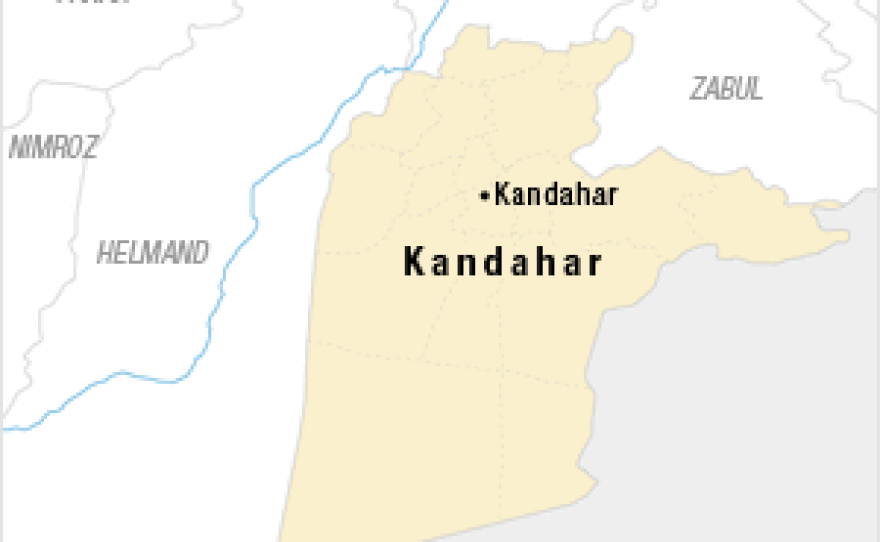The Taliban insurgency is just one of the major problems in Kandahar, the southern Afghan province where U.S. troops are mounting a new mission this summer and fall.
Fueling the insurgency is the fact that Afghans lack everything from clean water and electricity to schools and health clinics.
A crucial part of the upcoming U.S. military operation in Kandahar is how Afghans and their American partners hope to get government working again for the people.

As thousands of American troops fan out across Kandahar this summer, Afghan officials are hoping for just a few hundred bureaucrats to run the government here.
Earlier this week, more than 100 American officials, Afghan government officials and tribal leaders gathered to talk about the upcoming military operation at a conference held in Kandahar.
The discussion shifted from troops to government workers. Currently, some government offices in the province barely have a skeleton staff. Some districts have only a governor and a police chief, said Kandahar Gov. Tooryalai Wesa.
Wesa's modest plan for the next couple of months is to make sure each district has at least an attorney, a prosecutor and a judge, and a financial officer.
Security Main Obstacle To Local Governance
Jelani Popol, a Cabinet minister in Kabul, is in charge of working with local governments. The problem is that there aren't many local officials to work with. "The major obstacle for recruiting the bureaucrats is the security, because they are not sure about the security," Popol says.
There is good reason not to be sure. Just last week, a car bomb killed a district leader in downtown Kandahar. Even low-level government workers such as police are being targeted for assassination by militants.
Popol is trying to sweeten job offers with hardship pay -- extra money to work in dangerous areas. "We will provide additional incentives and allowances for the people to attract more qualified people to this job," he says.
Kandahar isn't the only dangerous area in Afghanistan where it's hard to recruit government workers. Just to the west in Helmand province, U.S. Marines are still clearing Taliban areas after a major offensive in February. And Popol is still short nearly half the bureaucrats he needs.

"Things are improving, but still we have to deal with some issues, like restoring the full confidence of the people that the government is staying -- not leaving them again to the Taliban, this kind of thing," Popol says.
Insecurity Fuels Insurgency
The lack of government workers is a significant reason the insurgency is so strong, notes Ambassador Mark Sedwill, the top NATO civilian representative in Afghanistan.
"Can their kids get to school? Is the school open? Can their wife go in the streets without fear? Is a policeman a reassuring presence or not? If they have a dispute with a neighbor, can they get that dispute resolved without paying a bribe? All those issues are the ones that in the end will determine success," he says.
That success can come only from a responsive government, Sedwill says. Local governance is one of the key measures of whether the war is going well.
"That of course will show people that in the end, this isn't endless, that there is a strategy that enables us to hand responsibility to the Afghans, which is what they want, too," he says.
Efforts Also Hindered By Lack Of Money

But there is a chicken-and-egg problem: Good government works only when there is security. But without a working government, it is difficult to provide security. That's because without bureaucrats, there is no public spending and no public works jobs.
So the Taliban quickly moves to fill the void. They pay teenagers to plant roadside bombs and keep tabs on U.S. and Afghan troops.
A lack of government money to pay decent salaries is another problem. International aid organizations are scooping up educated Afghans in Kandahar, offering salaries that far exceed a government paycheck.
Wesa, the Kandahar governor, says he will try to recruit throughout the country, maybe even overseas, in the coming months. Wesa, who was raised in Kandahar, spent nearly two decades as a college professor in Canada.
"My recommendation from the very beginning is to bring former Afghans living overseas, Canada, the United States, Europe, Australia, those [countries] are full of experienced, educated Afghans," Wesa says.
Right now, many of those experienced educated Afghans are not working as district judges or finance officers. They're working as translators for the U.S. Army, making as much as $200,000 a year.
Copyright 2022 NPR. To see more, visit https://www.npr.org. 9(MDAzMjM2NDYzMDEyMzc1Njk5NjAxNzY3OQ001))







